Industry Based Learning: Analysis of the Nigerian Student Market
VerifiedAdded on 2020/04/01
|7
|1499
|42
Report
AI Summary
This report provides a comprehensive analysis of the Nigerian student market, exploring various aspects of international education for Nigerian students. It examines the role of education agents, their certifications, and the regulatory frameworks governing them, particularly in the UK. The report identifies the top destinations for Nigerian students, including the UK, Ghana, the United States, and others, along with popular programs pursued at the Masters level in countries like Canada, Germany, and the United States. It also highlights the number of Nigerian students studying abroad and the areas of study they are engaged in. The report further delves into the ranking of Nigerian universities, the challenges faced by students in visa applications, and the number of students graduating from the Nigerian secondary system. The report references multiple sources including UniAgents, IPRCNigeria, NAFSA, and UNESCO, to provide a well-rounded view of the current state of the Nigerian student market.
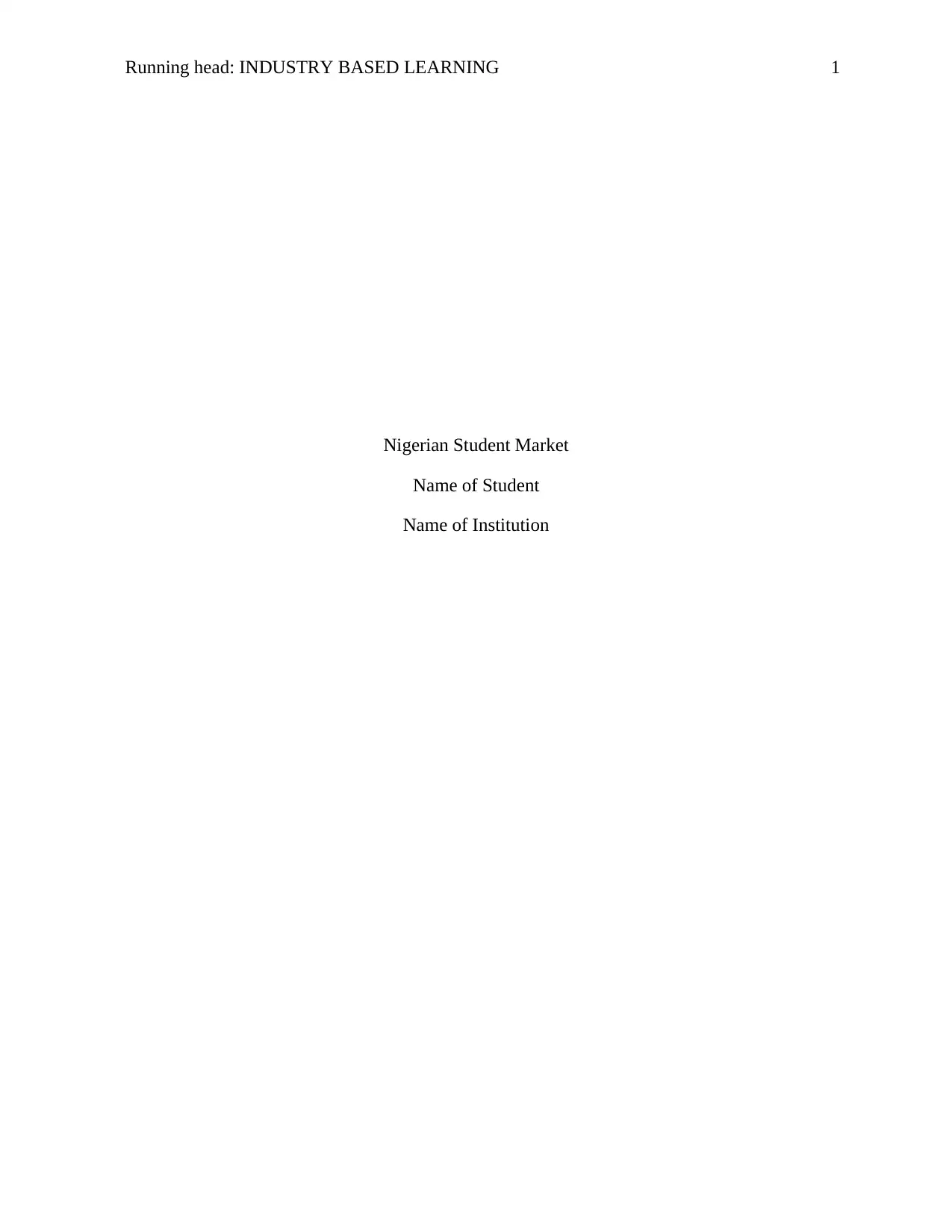
Running head: INDUSTRY BASED LEARNING 1
Nigerian Student Market
Name of Student
Name of Institution
Nigerian Student Market
Name of Student
Name of Institution
Paraphrase This Document
Need a fresh take? Get an instant paraphrase of this document with our AI Paraphraser
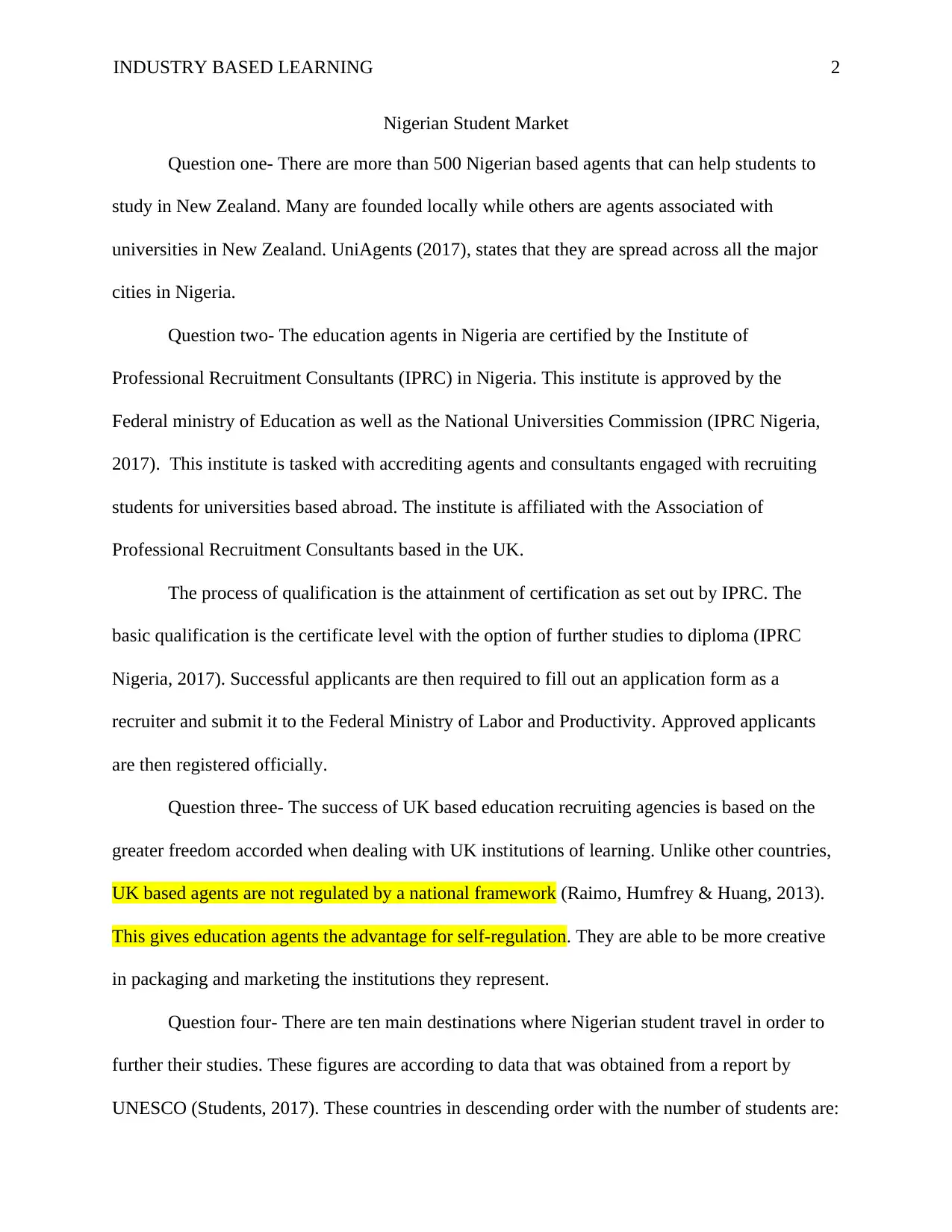
INDUSTRY BASED LEARNING 2
Nigerian Student Market
Question one- There are more than 500 Nigerian based agents that can help students to
study in New Zealand. Many are founded locally while others are agents associated with
universities in New Zealand. UniAgents (2017), states that they are spread across all the major
cities in Nigeria.
Question two- The education agents in Nigeria are certified by the Institute of
Professional Recruitment Consultants (IPRC) in Nigeria. This institute is approved by the
Federal ministry of Education as well as the National Universities Commission (IPRC Nigeria,
2017). This institute is tasked with accrediting agents and consultants engaged with recruiting
students for universities based abroad. The institute is affiliated with the Association of
Professional Recruitment Consultants based in the UK.
The process of qualification is the attainment of certification as set out by IPRC. The
basic qualification is the certificate level with the option of further studies to diploma (IPRC
Nigeria, 2017). Successful applicants are then required to fill out an application form as a
recruiter and submit it to the Federal Ministry of Labor and Productivity. Approved applicants
are then registered officially.
Question three- The success of UK based education recruiting agencies is based on the
greater freedom accorded when dealing with UK institutions of learning. Unlike other countries,
UK based agents are not regulated by a national framework (Raimo, Humfrey & Huang, 2013).
This gives education agents the advantage for self-regulation. They are able to be more creative
in packaging and marketing the institutions they represent.
Question four- There are ten main destinations where Nigerian student travel in order to
further their studies. These figures are according to data that was obtained from a report by
UNESCO (Students, 2017). These countries in descending order with the number of students are:
Nigerian Student Market
Question one- There are more than 500 Nigerian based agents that can help students to
study in New Zealand. Many are founded locally while others are agents associated with
universities in New Zealand. UniAgents (2017), states that they are spread across all the major
cities in Nigeria.
Question two- The education agents in Nigeria are certified by the Institute of
Professional Recruitment Consultants (IPRC) in Nigeria. This institute is approved by the
Federal ministry of Education as well as the National Universities Commission (IPRC Nigeria,
2017). This institute is tasked with accrediting agents and consultants engaged with recruiting
students for universities based abroad. The institute is affiliated with the Association of
Professional Recruitment Consultants based in the UK.
The process of qualification is the attainment of certification as set out by IPRC. The
basic qualification is the certificate level with the option of further studies to diploma (IPRC
Nigeria, 2017). Successful applicants are then required to fill out an application form as a
recruiter and submit it to the Federal Ministry of Labor and Productivity. Approved applicants
are then registered officially.
Question three- The success of UK based education recruiting agencies is based on the
greater freedom accorded when dealing with UK institutions of learning. Unlike other countries,
UK based agents are not regulated by a national framework (Raimo, Humfrey & Huang, 2013).
This gives education agents the advantage for self-regulation. They are able to be more creative
in packaging and marketing the institutions they represent.
Question four- There are ten main destinations where Nigerian student travel in order to
further their studies. These figures are according to data that was obtained from a report by
UNESCO (Students, 2017). These countries in descending order with the number of students are:
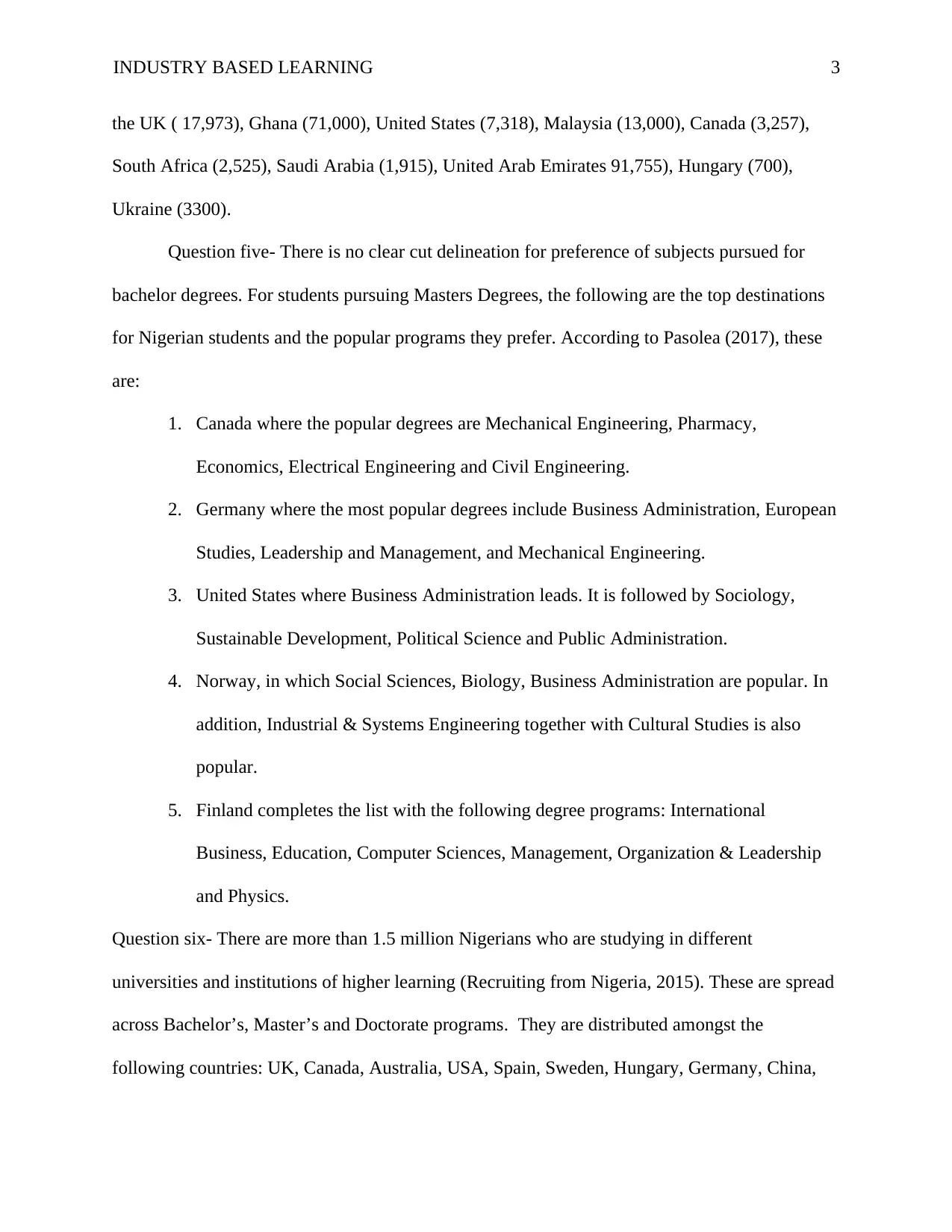
INDUSTRY BASED LEARNING 3
the UK ( 17,973), Ghana (71,000), United States (7,318), Malaysia (13,000), Canada (3,257),
South Africa (2,525), Saudi Arabia (1,915), United Arab Emirates 91,755), Hungary (700),
Ukraine (3300).
Question five- There is no clear cut delineation for preference of subjects pursued for
bachelor degrees. For students pursuing Masters Degrees, the following are the top destinations
for Nigerian students and the popular programs they prefer. According to Pasolea (2017), these
are:
1. Canada where the popular degrees are Mechanical Engineering, Pharmacy,
Economics, Electrical Engineering and Civil Engineering.
2. Germany where the most popular degrees include Business Administration, European
Studies, Leadership and Management, and Mechanical Engineering.
3. United States where Business Administration leads. It is followed by Sociology,
Sustainable Development, Political Science and Public Administration.
4. Norway, in which Social Sciences, Biology, Business Administration are popular. In
addition, Industrial & Systems Engineering together with Cultural Studies is also
popular.
5. Finland completes the list with the following degree programs: International
Business, Education, Computer Sciences, Management, Organization & Leadership
and Physics.
Question six- There are more than 1.5 million Nigerians who are studying in different
universities and institutions of higher learning (Recruiting from Nigeria, 2015). These are spread
across Bachelor’s, Master’s and Doctorate programs. They are distributed amongst the
following countries: UK, Canada, Australia, USA, Spain, Sweden, Hungary, Germany, China,
the UK ( 17,973), Ghana (71,000), United States (7,318), Malaysia (13,000), Canada (3,257),
South Africa (2,525), Saudi Arabia (1,915), United Arab Emirates 91,755), Hungary (700),
Ukraine (3300).
Question five- There is no clear cut delineation for preference of subjects pursued for
bachelor degrees. For students pursuing Masters Degrees, the following are the top destinations
for Nigerian students and the popular programs they prefer. According to Pasolea (2017), these
are:
1. Canada where the popular degrees are Mechanical Engineering, Pharmacy,
Economics, Electrical Engineering and Civil Engineering.
2. Germany where the most popular degrees include Business Administration, European
Studies, Leadership and Management, and Mechanical Engineering.
3. United States where Business Administration leads. It is followed by Sociology,
Sustainable Development, Political Science and Public Administration.
4. Norway, in which Social Sciences, Biology, Business Administration are popular. In
addition, Industrial & Systems Engineering together with Cultural Studies is also
popular.
5. Finland completes the list with the following degree programs: International
Business, Education, Computer Sciences, Management, Organization & Leadership
and Physics.
Question six- There are more than 1.5 million Nigerians who are studying in different
universities and institutions of higher learning (Recruiting from Nigeria, 2015). These are spread
across Bachelor’s, Master’s and Doctorate programs. They are distributed amongst the
following countries: UK, Canada, Australia, USA, Spain, Sweden, Hungary, Germany, China,
⊘ This is a preview!⊘
Do you want full access?
Subscribe today to unlock all pages.

Trusted by 1+ million students worldwide
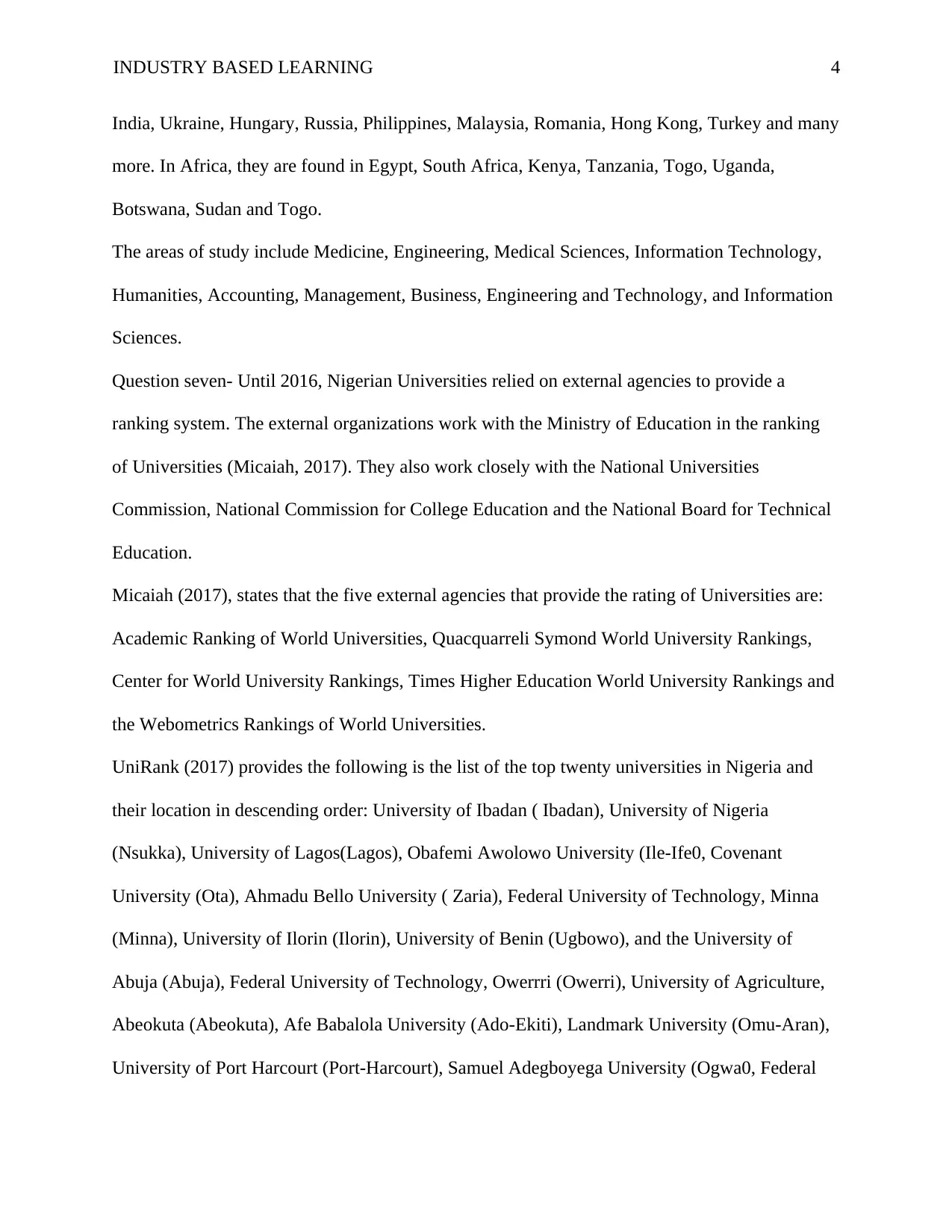
INDUSTRY BASED LEARNING 4
India, Ukraine, Hungary, Russia, Philippines, Malaysia, Romania, Hong Kong, Turkey and many
more. In Africa, they are found in Egypt, South Africa, Kenya, Tanzania, Togo, Uganda,
Botswana, Sudan and Togo.
The areas of study include Medicine, Engineering, Medical Sciences, Information Technology,
Humanities, Accounting, Management, Business, Engineering and Technology, and Information
Sciences.
Question seven- Until 2016, Nigerian Universities relied on external agencies to provide a
ranking system. The external organizations work with the Ministry of Education in the ranking
of Universities (Micaiah, 2017). They also work closely with the National Universities
Commission, National Commission for College Education and the National Board for Technical
Education.
Micaiah (2017), states that the five external agencies that provide the rating of Universities are:
Academic Ranking of World Universities, Quacquarreli Symond World University Rankings,
Center for World University Rankings, Times Higher Education World University Rankings and
the Webometrics Rankings of World Universities.
UniRank (2017) provides the following is the list of the top twenty universities in Nigeria and
their location in descending order: University of Ibadan ( Ibadan), University of Nigeria
(Nsukka), University of Lagos(Lagos), Obafemi Awolowo University (Ile-Ife0, Covenant
University (Ota), Ahmadu Bello University ( Zaria), Federal University of Technology, Minna
(Minna), University of Ilorin (Ilorin), University of Benin (Ugbowo), and the University of
Abuja (Abuja), Federal University of Technology, Owerrri (Owerri), University of Agriculture,
Abeokuta (Abeokuta), Afe Babalola University (Ado-Ekiti), Landmark University (Omu-Aran),
University of Port Harcourt (Port-Harcourt), Samuel Adegboyega University (Ogwa0, Federal
India, Ukraine, Hungary, Russia, Philippines, Malaysia, Romania, Hong Kong, Turkey and many
more. In Africa, they are found in Egypt, South Africa, Kenya, Tanzania, Togo, Uganda,
Botswana, Sudan and Togo.
The areas of study include Medicine, Engineering, Medical Sciences, Information Technology,
Humanities, Accounting, Management, Business, Engineering and Technology, and Information
Sciences.
Question seven- Until 2016, Nigerian Universities relied on external agencies to provide a
ranking system. The external organizations work with the Ministry of Education in the ranking
of Universities (Micaiah, 2017). They also work closely with the National Universities
Commission, National Commission for College Education and the National Board for Technical
Education.
Micaiah (2017), states that the five external agencies that provide the rating of Universities are:
Academic Ranking of World Universities, Quacquarreli Symond World University Rankings,
Center for World University Rankings, Times Higher Education World University Rankings and
the Webometrics Rankings of World Universities.
UniRank (2017) provides the following is the list of the top twenty universities in Nigeria and
their location in descending order: University of Ibadan ( Ibadan), University of Nigeria
(Nsukka), University of Lagos(Lagos), Obafemi Awolowo University (Ile-Ife0, Covenant
University (Ota), Ahmadu Bello University ( Zaria), Federal University of Technology, Minna
(Minna), University of Ilorin (Ilorin), University of Benin (Ugbowo), and the University of
Abuja (Abuja), Federal University of Technology, Owerrri (Owerri), University of Agriculture,
Abeokuta (Abeokuta), Afe Babalola University (Ado-Ekiti), Landmark University (Omu-Aran),
University of Port Harcourt (Port-Harcourt), Samuel Adegboyega University (Ogwa0, Federal
Paraphrase This Document
Need a fresh take? Get an instant paraphrase of this document with our AI Paraphraser
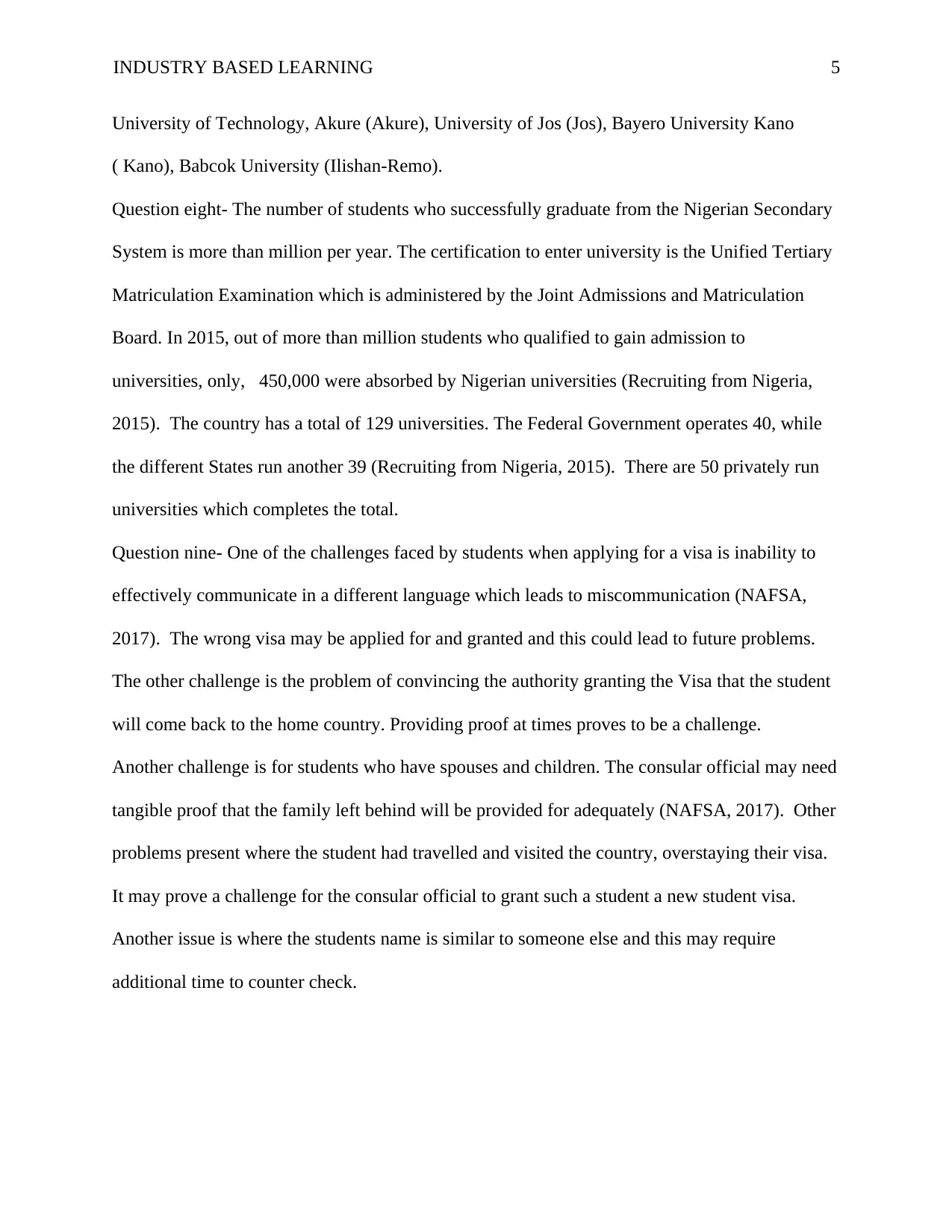
INDUSTRY BASED LEARNING 5
University of Technology, Akure (Akure), University of Jos (Jos), Bayero University Kano
( Kano), Babcok University (Ilishan-Remo).
Question eight- The number of students who successfully graduate from the Nigerian Secondary
System is more than million per year. The certification to enter university is the Unified Tertiary
Matriculation Examination which is administered by the Joint Admissions and Matriculation
Board. In 2015, out of more than million students who qualified to gain admission to
universities, only, 450,000 were absorbed by Nigerian universities (Recruiting from Nigeria,
2015). The country has a total of 129 universities. The Federal Government operates 40, while
the different States run another 39 (Recruiting from Nigeria, 2015). There are 50 privately run
universities which completes the total.
Question nine- One of the challenges faced by students when applying for a visa is inability to
effectively communicate in a different language which leads to miscommunication (NAFSA,
2017). The wrong visa may be applied for and granted and this could lead to future problems.
The other challenge is the problem of convincing the authority granting the Visa that the student
will come back to the home country. Providing proof at times proves to be a challenge.
Another challenge is for students who have spouses and children. The consular official may need
tangible proof that the family left behind will be provided for adequately (NAFSA, 2017). Other
problems present where the student had travelled and visited the country, overstaying their visa.
It may prove a challenge for the consular official to grant such a student a new student visa.
Another issue is where the students name is similar to someone else and this may require
additional time to counter check.
University of Technology, Akure (Akure), University of Jos (Jos), Bayero University Kano
( Kano), Babcok University (Ilishan-Remo).
Question eight- The number of students who successfully graduate from the Nigerian Secondary
System is more than million per year. The certification to enter university is the Unified Tertiary
Matriculation Examination which is administered by the Joint Admissions and Matriculation
Board. In 2015, out of more than million students who qualified to gain admission to
universities, only, 450,000 were absorbed by Nigerian universities (Recruiting from Nigeria,
2015). The country has a total of 129 universities. The Federal Government operates 40, while
the different States run another 39 (Recruiting from Nigeria, 2015). There are 50 privately run
universities which completes the total.
Question nine- One of the challenges faced by students when applying for a visa is inability to
effectively communicate in a different language which leads to miscommunication (NAFSA,
2017). The wrong visa may be applied for and granted and this could lead to future problems.
The other challenge is the problem of convincing the authority granting the Visa that the student
will come back to the home country. Providing proof at times proves to be a challenge.
Another challenge is for students who have spouses and children. The consular official may need
tangible proof that the family left behind will be provided for adequately (NAFSA, 2017). Other
problems present where the student had travelled and visited the country, overstaying their visa.
It may prove a challenge for the consular official to grant such a student a new student visa.
Another issue is where the students name is similar to someone else and this may require
additional time to counter check.
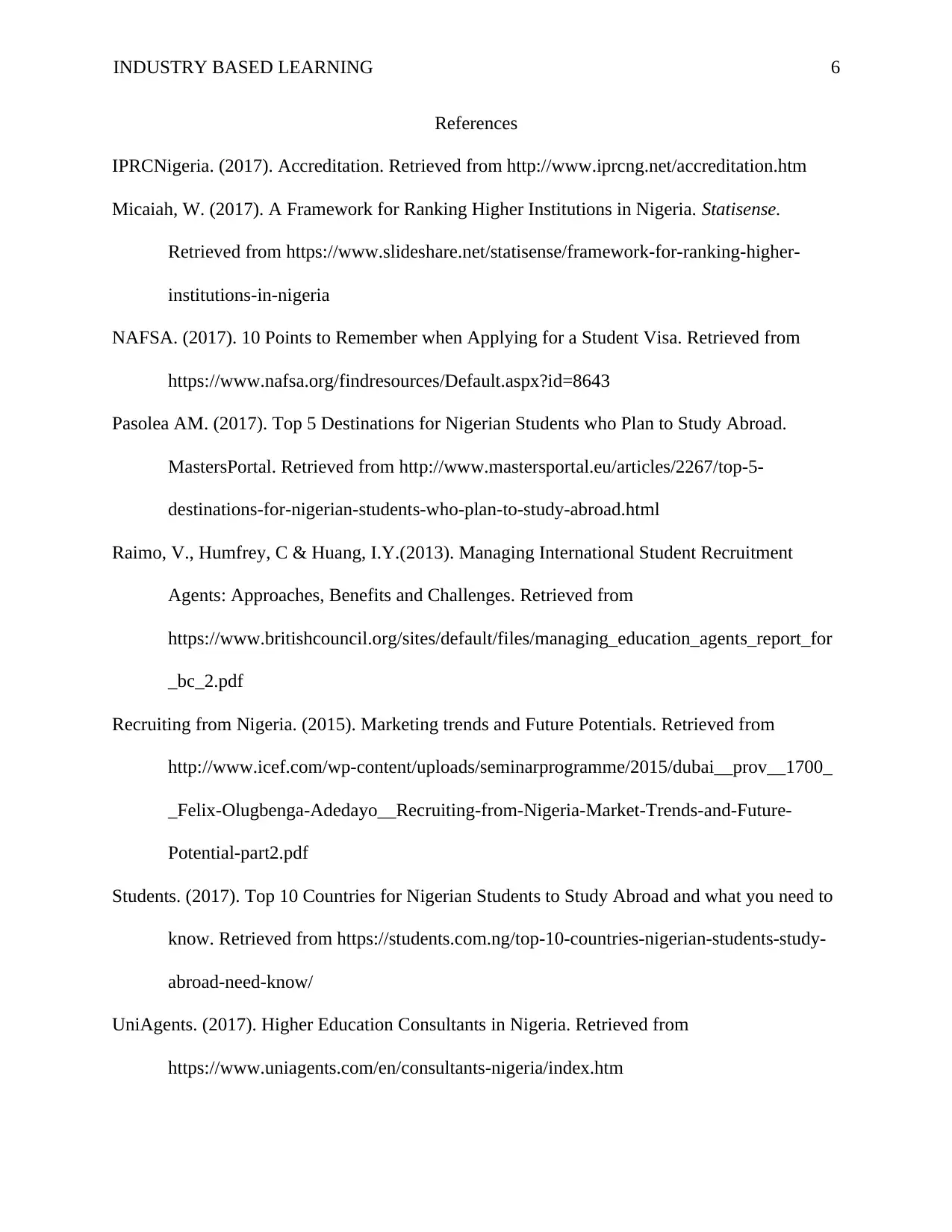
INDUSTRY BASED LEARNING 6
References
IPRCNigeria. (2017). Accreditation. Retrieved from http://www.iprcng.net/accreditation.htm
Micaiah, W. (2017). A Framework for Ranking Higher Institutions in Nigeria. Statisense.
Retrieved from https://www.slideshare.net/statisense/framework-for-ranking-higher-
institutions-in-nigeria
NAFSA. (2017). 10 Points to Remember when Applying for a Student Visa. Retrieved from
https://www.nafsa.org/findresources/Default.aspx?id=8643
Pasolea AM. (2017). Top 5 Destinations for Nigerian Students who Plan to Study Abroad.
MastersPortal. Retrieved from http://www.mastersportal.eu/articles/2267/top-5-
destinations-for-nigerian-students-who-plan-to-study-abroad.html
Raimo, V., Humfrey, C & Huang, I.Y.(2013). Managing International Student Recruitment
Agents: Approaches, Benefits and Challenges. Retrieved from
https://www.britishcouncil.org/sites/default/files/managing_education_agents_report_for
_bc_2.pdf
Recruiting from Nigeria. (2015). Marketing trends and Future Potentials. Retrieved from
http://www.icef.com/wp-content/uploads/seminarprogramme/2015/dubai__prov__1700_
_Felix-Olugbenga-Adedayo__Recruiting-from-Nigeria-Market-Trends-and-Future-
Potential-part2.pdf
Students. (2017). Top 10 Countries for Nigerian Students to Study Abroad and what you need to
know. Retrieved from https://students.com.ng/top-10-countries-nigerian-students-study-
abroad-need-know/
UniAgents. (2017). Higher Education Consultants in Nigeria. Retrieved from
https://www.uniagents.com/en/consultants-nigeria/index.htm
References
IPRCNigeria. (2017). Accreditation. Retrieved from http://www.iprcng.net/accreditation.htm
Micaiah, W. (2017). A Framework for Ranking Higher Institutions in Nigeria. Statisense.
Retrieved from https://www.slideshare.net/statisense/framework-for-ranking-higher-
institutions-in-nigeria
NAFSA. (2017). 10 Points to Remember when Applying for a Student Visa. Retrieved from
https://www.nafsa.org/findresources/Default.aspx?id=8643
Pasolea AM. (2017). Top 5 Destinations for Nigerian Students who Plan to Study Abroad.
MastersPortal. Retrieved from http://www.mastersportal.eu/articles/2267/top-5-
destinations-for-nigerian-students-who-plan-to-study-abroad.html
Raimo, V., Humfrey, C & Huang, I.Y.(2013). Managing International Student Recruitment
Agents: Approaches, Benefits and Challenges. Retrieved from
https://www.britishcouncil.org/sites/default/files/managing_education_agents_report_for
_bc_2.pdf
Recruiting from Nigeria. (2015). Marketing trends and Future Potentials. Retrieved from
http://www.icef.com/wp-content/uploads/seminarprogramme/2015/dubai__prov__1700_
_Felix-Olugbenga-Adedayo__Recruiting-from-Nigeria-Market-Trends-and-Future-
Potential-part2.pdf
Students. (2017). Top 10 Countries for Nigerian Students to Study Abroad and what you need to
know. Retrieved from https://students.com.ng/top-10-countries-nigerian-students-study-
abroad-need-know/
UniAgents. (2017). Higher Education Consultants in Nigeria. Retrieved from
https://www.uniagents.com/en/consultants-nigeria/index.htm
⊘ This is a preview!⊘
Do you want full access?
Subscribe today to unlock all pages.

Trusted by 1+ million students worldwide
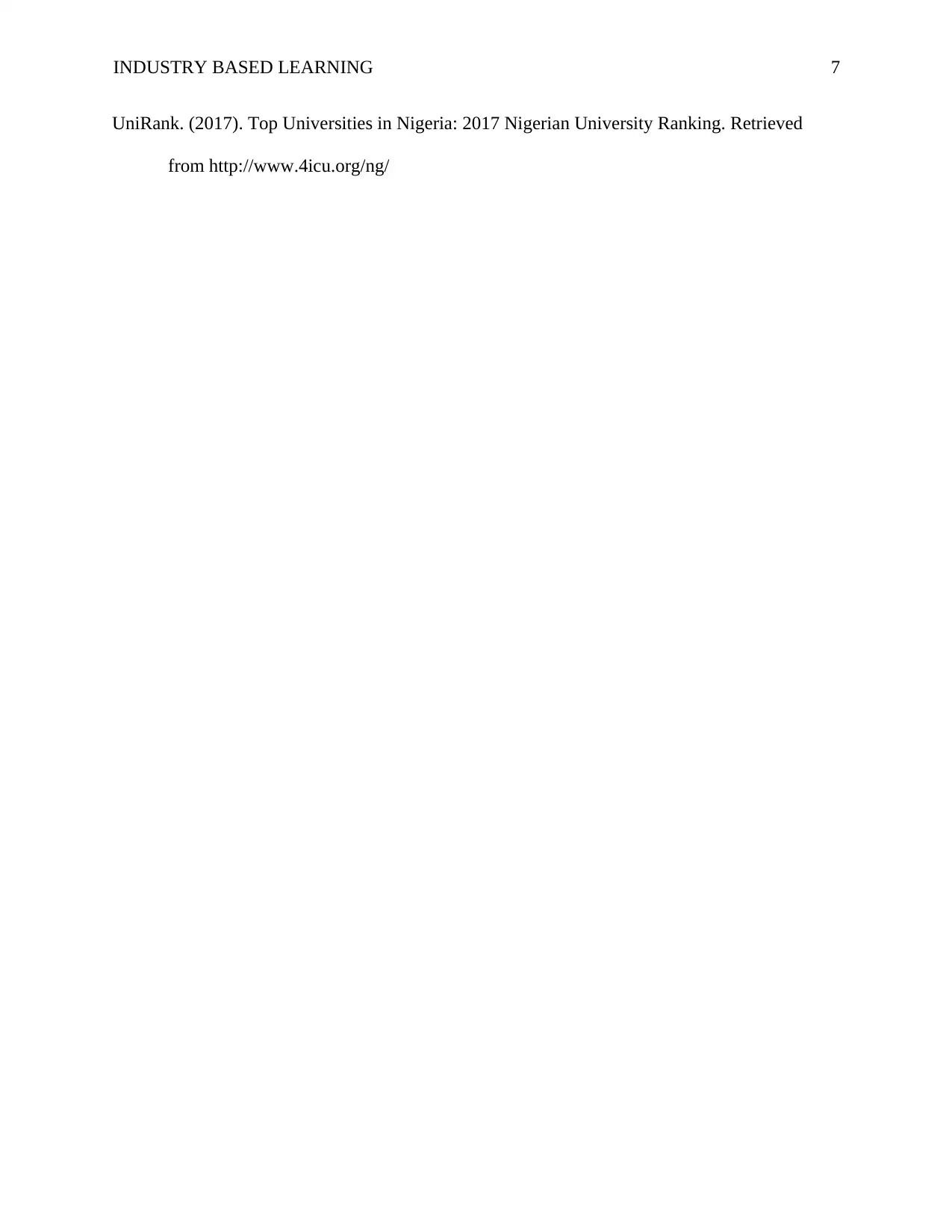
INDUSTRY BASED LEARNING 7
UniRank. (2017). Top Universities in Nigeria: 2017 Nigerian University Ranking. Retrieved
from http://www.4icu.org/ng/
UniRank. (2017). Top Universities in Nigeria: 2017 Nigerian University Ranking. Retrieved
from http://www.4icu.org/ng/
1 out of 7
Related Documents
Your All-in-One AI-Powered Toolkit for Academic Success.
+13062052269
info@desklib.com
Available 24*7 on WhatsApp / Email
![[object Object]](/_next/static/media/star-bottom.7253800d.svg)
Unlock your academic potential
Copyright © 2020–2026 A2Z Services. All Rights Reserved. Developed and managed by ZUCOL.




